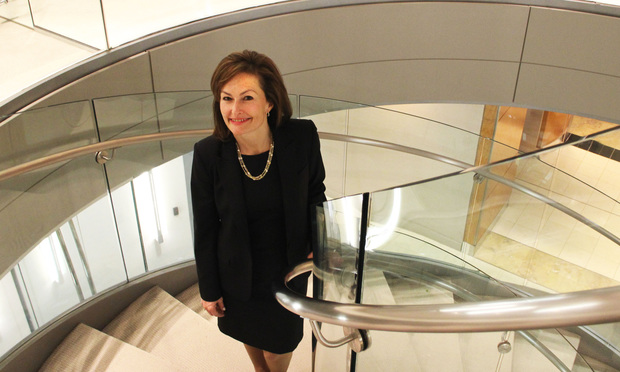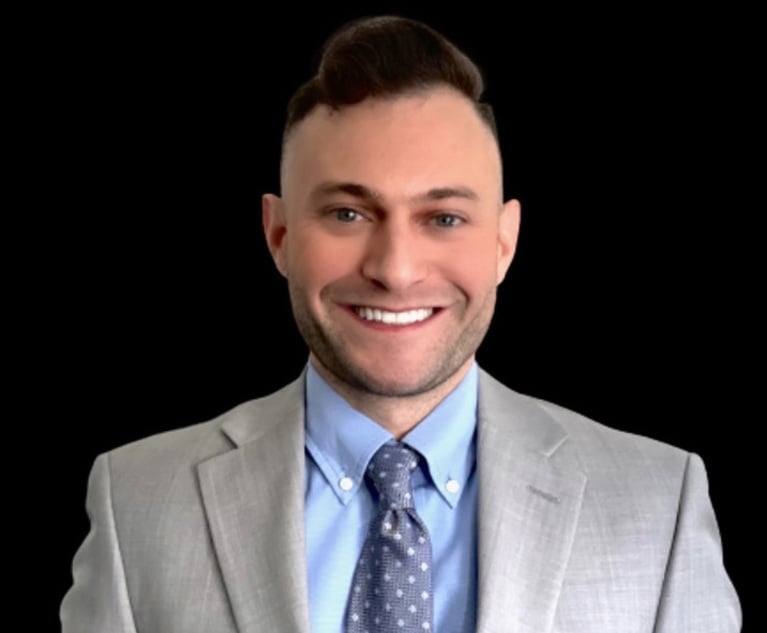Heart-Monitoring Patent Gives Life to New Section 101 Dispute
Judges for the U.S. Court of Appeals for the Federal Circuit disagree whether prior art outside the prosecution history should be consulted when deciding if a patent is directed to a longstanding "abstract idea."
April 17, 2020 at 08:20 PM
3 minute read
 Federal Circuit Judge Kara Stoll
Federal Circuit Judge Kara StollThe U.S. Court of Appeals for the Federal Circuit has revived a long-running patent infringement fight between providers of ambulatory cardiac monitoring systems. Along the way it's opened a new front in the ongoing debate over how to properly analyze Section 101 defenses.
The court found that a CardioNet Inc. patent on an automated process for identifying atrial fibrillation and flutter, and distinguishing them from more benign forms of cardiac arrhythmia, is eligible for patent protection.
"In our view, the claims 'focus on a specific means or method that improves' cardiac monitoring technology; they are not 'directed to a result or effect that itself is the abstract idea and merely invoke generic processes and machinery,'" Judge Kara Stoll wrote for the majority in CardioNet v. InfoBionic.
It's a much-needed win for CardioNet, now known as BioTelemtry Inc., and Sidley Austin, which had struck out before District Judge Indira Talwani of the U.S. District Court of Massachusetts and the Patent Trial and Appeal Board on several other patents. As for the patent before the Federal Circuit on Friday, Talwani had found it directed to the abstract idea of collecting and analyzing information, albeit potentially life-saving information.
CardioNet had argued that its claim specification explains that the invention achieves more accurate and clinically significant detection of atrial fibrillation and atrial flutter. But Talwani ruled that CardioNet had failed to identify improvements to any particularized computer technology.
On appeal, the parties disputed whether a district judge ought to consider prior art in making such a determination. Stoll said no. When considering patent eligibility on the pleadings, the court may consult the plain claim language, written description and prosecution history. But "the court need not consult the prior art to see if, in fact, the assertions of improvement in the patent's written description are true."
Judge S. Jay Plager concurred.
That provoked a dissent from Judge Timothy Dyk, even though he agreed with Stoll that the CardioNet patent should be eligible. "The Supreme Court and our cases have consistently held that whether a practice is 'longstanding' or 'long prevalent' is central to the step one inquiry and have never suggested that prior art is irrelevant to that question," Dyk wrote.
Stoll replied that a district judge can take judicial notice of a longstanding practice if there's no evidence of such practice in the intrinsic record. "But there is no basis for requiring, as a matter of law, consideration of the prior art in the step one analysis in every case," she wrote.
Sidley partner Ching-Lee Fukuda had the winning argument for CardioNet. Also on the briefs were Sidley partner Jim Badke, counsel Todd Simpson and associate Nathan Greenblatt.
InfoBionic was represented by Latham & Watkins.
This content has been archived. It is available through our partners, LexisNexis® and Bloomberg Law.
To view this content, please continue to their sites.
Not a Lexis Subscriber?
Subscribe Now
Not a Bloomberg Law Subscriber?
Subscribe Now
NOT FOR REPRINT
© 2025 ALM Global, LLC, All Rights Reserved. Request academic re-use from www.copyright.com. All other uses, submit a request to [email protected]. For more information visit Asset & Logo Licensing.
You Might Like
View All
Hogan Lovells, Jenner & Block Challenge Trump EOs Impacting Gender-Affirming Care
3 minute read
RFK Jr. Will Keep Affiliations With Morgan & Morgan, Other Law Firms If Confirmed to DHHS
3 minute read
'Religious Discrimination'?: 4th Circuit Revives Challenge to Employer Vaccine Mandate
2 minute read
'Pull Back the Curtain': Ex-NFL Players Seek Discovery in Lawsuit Over League's Disability Plan
Law Firms Mentioned
Trending Stories
- 1Buyer Beware:Continuity of Coverage in Legal Malpractice Insurance
- 2‘Listen, Listen, Listen’: Some Practice Tips From Judges in the Oakland Federal Courthouse
- 3BCLP Joins Saudi Legal Market with Plans to Open Two Offices
- 4White & Case Crosses $4M in PEP, $3B in Revenue in 'Breakthrough Year'
- 5Thursday Newspaper
Who Got The Work
J. Brugh Lower of Gibbons has entered an appearance for industrial equipment supplier Devco Corporation in a pending trademark infringement lawsuit. The suit, accusing the defendant of selling knock-off Graco products, was filed Dec. 18 in New Jersey District Court by Rivkin Radler on behalf of Graco Inc. and Graco Minnesota. The case, assigned to U.S. District Judge Zahid N. Quraishi, is 3:24-cv-11294, Graco Inc. et al v. Devco Corporation.
Who Got The Work
Rebecca Maller-Stein and Kent A. Yalowitz of Arnold & Porter Kaye Scholer have entered their appearances for Hanaco Venture Capital and its executives, Lior Prosor and David Frankel, in a pending securities lawsuit. The action, filed on Dec. 24 in New York Southern District Court by Zell, Aron & Co. on behalf of Goldeneye Advisors, accuses the defendants of negligently and fraudulently managing the plaintiff's $1 million investment. The case, assigned to U.S. District Judge Vernon S. Broderick, is 1:24-cv-09918, Goldeneye Advisors, LLC v. Hanaco Venture Capital, Ltd. et al.
Who Got The Work
Attorneys from A&O Shearman has stepped in as defense counsel for Toronto-Dominion Bank and other defendants in a pending securities class action. The suit, filed Dec. 11 in New York Southern District Court by Bleichmar Fonti & Auld, accuses the defendants of concealing the bank's 'pervasive' deficiencies in regards to its compliance with the Bank Secrecy Act and the quality of its anti-money laundering controls. The case, assigned to U.S. District Judge Arun Subramanian, is 1:24-cv-09445, Gonzalez v. The Toronto-Dominion Bank et al.
Who Got The Work
Crown Castle International, a Pennsylvania company providing shared communications infrastructure, has turned to Luke D. Wolf of Gordon Rees Scully Mansukhani to fend off a pending breach-of-contract lawsuit. The court action, filed Nov. 25 in Michigan Eastern District Court by Hooper Hathaway PC on behalf of The Town Residences LLC, accuses Crown Castle of failing to transfer approximately $30,000 in utility payments from T-Mobile in breach of a roof-top lease and assignment agreement. The case, assigned to U.S. District Judge Susan K. Declercq, is 2:24-cv-13131, The Town Residences LLC v. T-Mobile US, Inc. et al.
Who Got The Work
Wilfred P. Coronato and Daniel M. Schwartz of McCarter & English have stepped in as defense counsel to Electrolux Home Products Inc. in a pending product liability lawsuit. The court action, filed Nov. 26 in New York Eastern District Court by Poulos Lopiccolo PC and Nagel Rice LLP on behalf of David Stern, alleges that the defendant's refrigerators’ drawers and shelving repeatedly break and fall apart within months after purchase. The case, assigned to U.S. District Judge Joan M. Azrack, is 2:24-cv-08204, Stern v. Electrolux Home Products, Inc.
Featured Firms
Law Offices of Gary Martin Hays & Associates, P.C.
(470) 294-1674
Law Offices of Mark E. Salomone
(857) 444-6468
Smith & Hassler
(713) 739-1250








